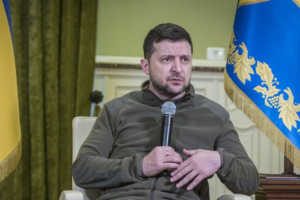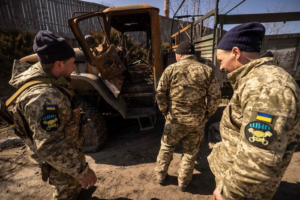

British energy giant
PLC said Sunday it will exit its nearly 20% stake in Russian government-controlled oil producer
days after it was pressured to unload the holding by U.K. officials amid Russia’s invasion of Ukraine.
The British company faces a potential loss of as much as $25 billion—encompassing the maximum possible impact of selling the Rosneft stake, valued at $14 billion, plus a big expected charge related to foreign-exchange losses. Currently, BP relies on Rosneft for roughly one-third of its oil-and-gas production.
BP Chief Executive
Bernard Looney
and former CEO
Bob Dudley
will resign from Rosneft’s board, the British company said.
It is unclear how BP will exit the Rosneft stake during a tumultuous time for Russian companies, which face a growing array of sanctions and limits on their ability to access the global financial system. All of that could affect BP’s ability to recover the holding’s full value.
BP’s decision reflected a rapidly escalating pullback by Western businesses facing moral and political pressure to sever Russian relationships following the country’s military campaign against Ukraine.
Norway on Sunday said it would move to freeze and banish Russian assets from its more-than-$1 trillion sovereign-wealth fund. European and U.S. officials said they planned to cut some Russian banks off from the Swift financial network, a core conduit for international payments in foreign trade. And the world’s largest cryptocurrency exchange, Binance, said it is taking action against sanctioned parties, potentially crippling flows of wealth that travel outside traditional banking channels.

A Rosneft gas station in Moscow.
Photo:
Vyacheslav Prokofyev/Zuma Press
Analysts and bankers have said another government-sponsored buyer could be interested in acquiring BP’s Rosneft stake, citing the Qatari sovereign-wealth fund’s Rosneft holding and potential Chinese interest.
But rapidly changing events in Ukraine make any transaction more complicated than it appeared two weeks ago, making a Russian buyer or consortium of buyers look most likely, bankers said Sunday. BP would do well to unload the stake quickly, even at a bargain price, while oil prices are rising, one banker said.
BP will no longer count on Rosneft dividends, the company said Sunday. A potential write-down of the Rosneft stake would be based on its carrying value at the end of the first quarter.
For BP, the pain will include $11 billion in accumulated foreign-exchange losses on BP’s books. That is because the change in the nature of BP’s longtime Rosneft relationship will affect how those losses are accounted for, the company said.
The abrupt move comes after Mr. Looney held a roughly 20-minute video call Friday with
Kwasi Kwarteng,
British Secretary of State for Business, Energy and Industrial Strategy. Mr. Kwarteng expressed deep concern about BP owning the stake.
BP board members held emergency meetings Friday and over the weekend to discuss the situation, according to a person familiar with the matter.
The U.K. company is the most-exposed of oil-and-gas majors to Russia, analysts say. BP’s 19.75% stake in Rosneft brought it $640 million in dividends in 2021. Analysts expected 2022 dividends to be worth well over $1 billion.
BP has been under pressure to reassure investors that its declining oil-and-gas production won’t cripple earnings in coming years as it shifts to lower-carbon investments. Like peers, BP reported strong fourth-quarter and 2021 earnings. Its full-year 2021 profit, called underlying replacement-cost profit, was almost $13 billion, a comeback from its 2020 loss of almost $5.7 billion.
“‘Russia’s attack on Ukraine is an act of aggression which is having tragic consequences across the region.’”
Flush with cash, the company has increased share buybacks and paid down billions in debt. On Sunday, it reiterated plans to spend about $4 billion each year, on average, through 2025 buying back shares.
BP doesn’t invest capital in the Rosneft holding. But one gauge of longer-term pain from exiting the stake is the company’s newly forecast $2 billion hit to an annual bottom-line measure of earnings before taxes and other accounting factors. In 2025, for instance, the Rosneft exit will translate to $38 billion instead of $40 billion by that earnings measure, BP said.
On Sunday, BP also said it would exit three Russian joint ventures, together valued at $1.4 billion, at year-end. Those include stakes in a Siberian oil-production field and energy-exploration projects. BP has about 200 employees in Russia, according to a spokesman.
The BP-Rosneft strategic partnership dates back more than two decades, and BP’s presence in Russia goes back 30 years. Earlier this month, Mr. Looney cited that history on a call with analysts as evidence of the company’s staying power in Russia through geopolitical tensions.
“One of the things I’ve learned in my life, you’ve probably all learned in your life, is let’s not worry about things until they happen, and who knows what’s going to happen?” Mr. Looney told analysts Feb. 8 when the company reported banner profits from rising energy prices.

BP CEO Bernard Looney will resign from Rosneft’s board, the British oil major said.
Photo:
AMR ABDALLAH DALSH/REUTERS
Murray Auchincloss,
BP’s finance chief, repeated that confidence in an interview that same day, saying, “We’re kind of used to uncertain situations as we work in the oil-and-gas sector,” and adding that BP hadn’t seen material effects from previous sanctions.
The company’s position changed dramatically in a matter of days following Russia’s attack on Ukraine, reflecting the mounting political pressure by countries on companies doing business with Russian President
regime.
The developments also brought attention to ceremonial roles intertwined with Russian business relationships. Mr. Looney had served since 2020 alongside Mr. Putin on the board of the Russian Geographical Society. The position—which BP said involved one virtual meeting for Mr. Looney last year—also was a sore point for U.K. officials. On Sunday, BP said Mr. Looney will relinquish that role.
“I welcome BP’s decision to exit its shareholding in Rosneft oil company,” Mr. Kwarteng said on Twitter on Sunday night.
BP’s chairman,
Helge Lund,
said in a BP statement Sunday that Russia’s invasion was a game changer for the company.
“Russia’s attack on Ukraine is an act of aggression which is having tragic consequences across the region,” he said in the statement, adding, “our involvement with Rosneft, a state-owned enterprise, simply cannot continue.”
Write to Jenny Strasburg at jenny.strasburg@wsj.com
Copyright ©2022 Dow Jones & Company, Inc. All Rights Reserved. 87990cbe856818d5eddac44c7b1cdeb8
















